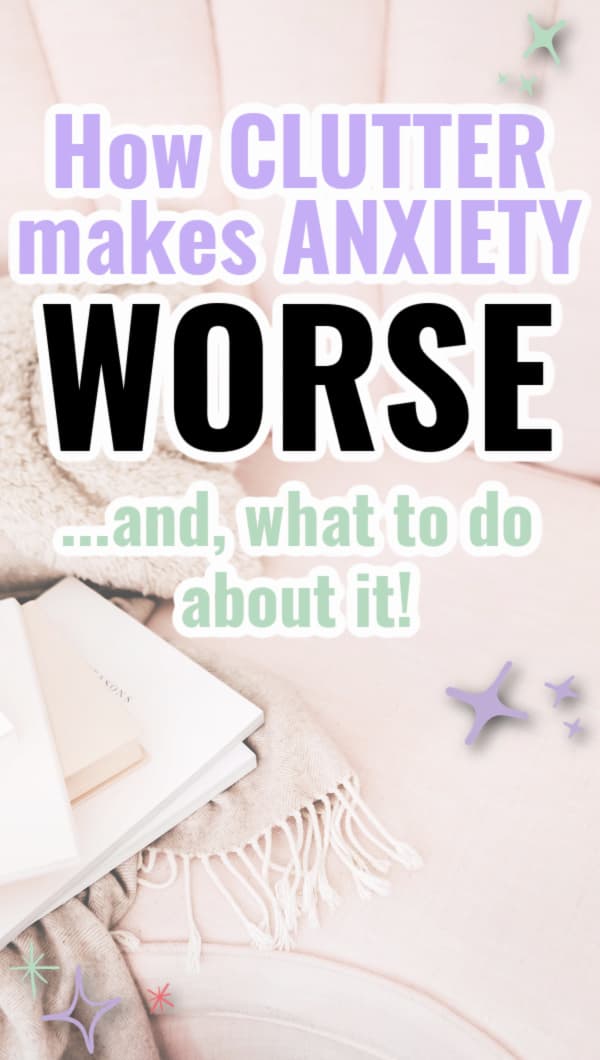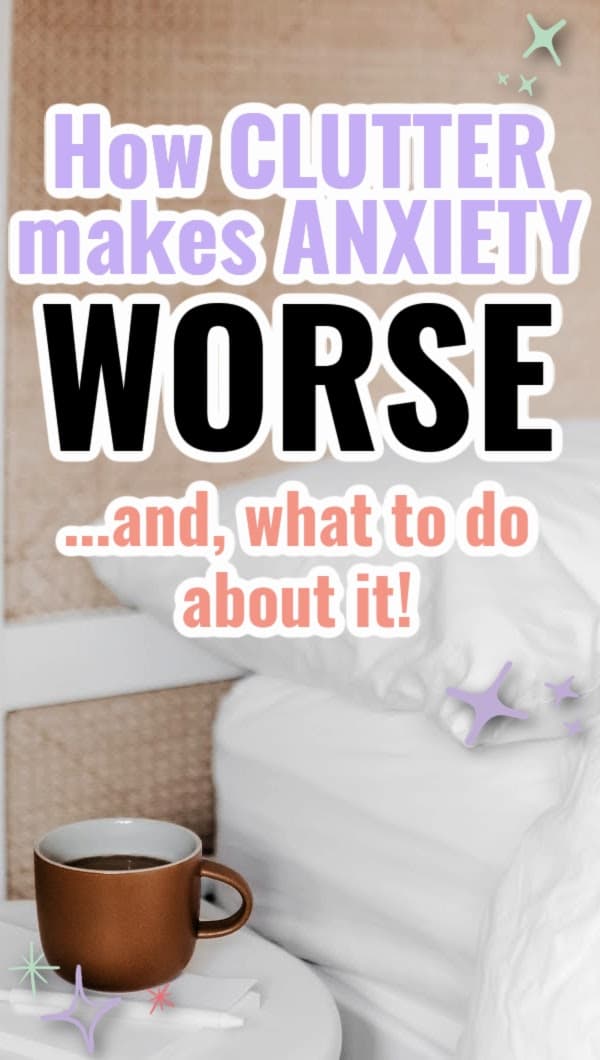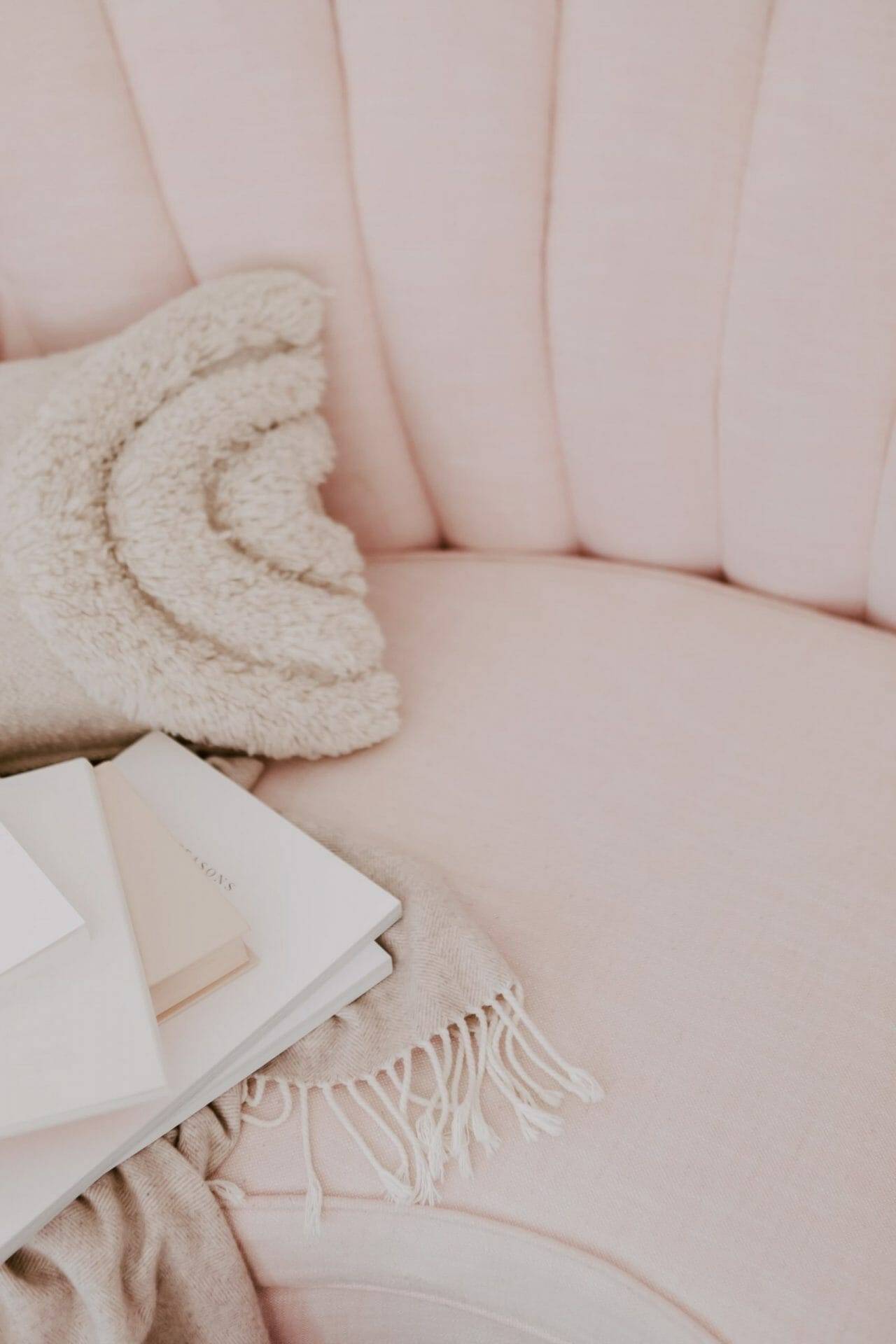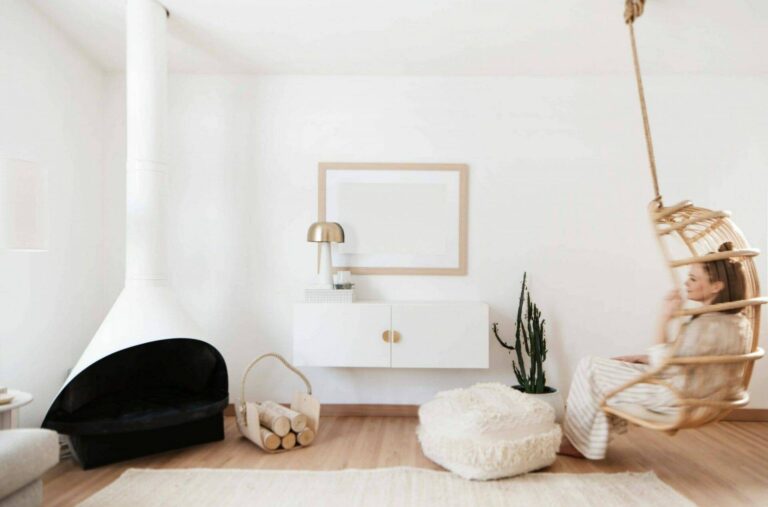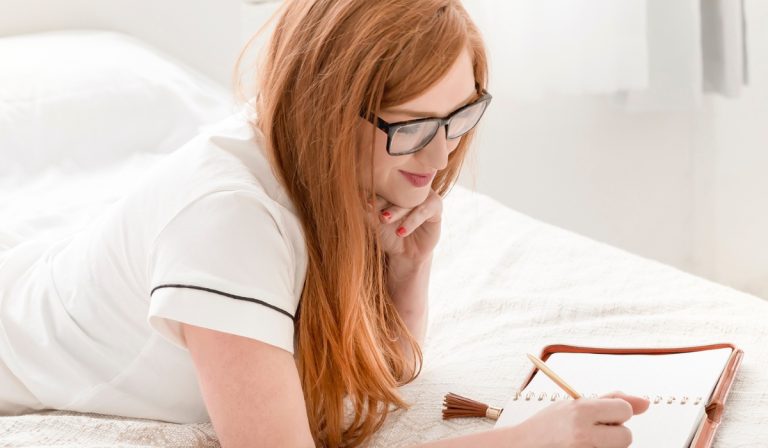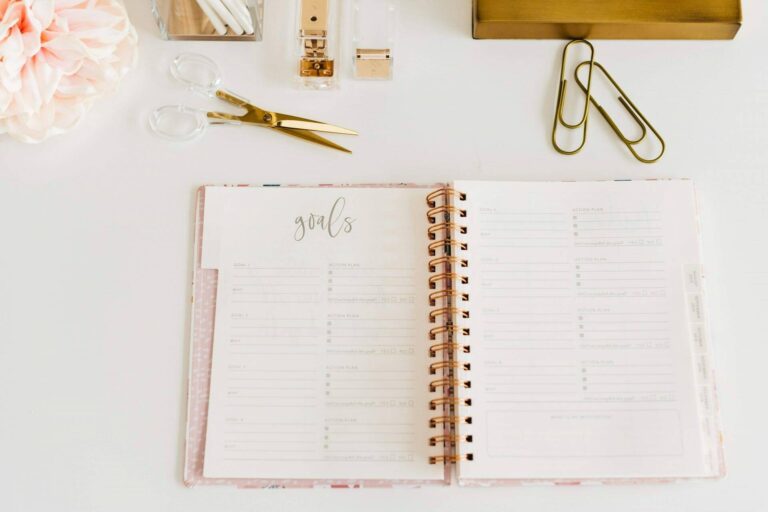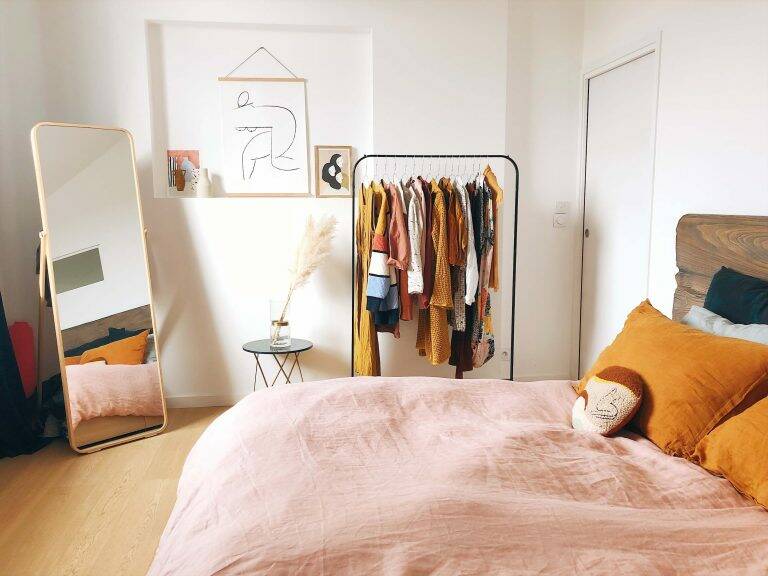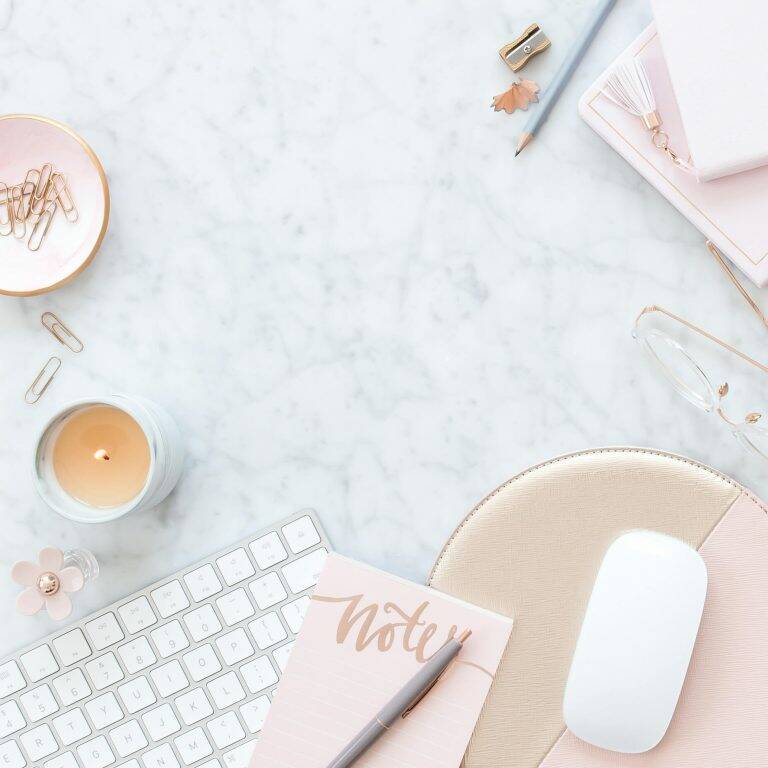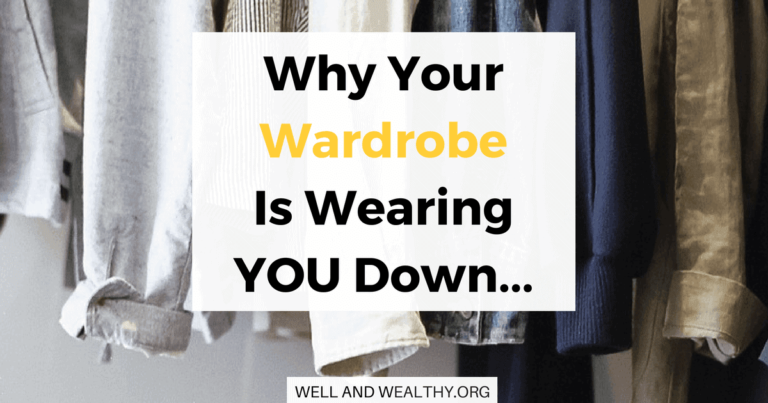How Clutter Contributes to Anxiety and What to Do About It [5 Ideas to Try Today]
Today I have a guest post from a professional organizer(!!!) who is here to explain why clutter is such a contributor to anxiety AND some simple methods that she uses with her clients that can help you declutter for the benefit of your mental health.
Without further ado let me introduce you to Jenny Morin from Efficient Spaces.
A recent client of mine actually moved out of her house into her RV because the clutter and grime she came home to (after a few months on vacation) gave her such acute anxiety.
She and her husband had allowed a friend to live in their beautiful home, and in her words, “he trashed it.” This meant she got a feeling of dread every time she came in the door and saw the mess, leading her back to her RV instead…
Another client has been living in an extremely cluttered home for over a year, and her anxiety peaks every time she has to find something amidst the piles.
She told me that having me with her gave her hope as we tackled each pile. “It’s like there is light at the end of the tunnel!” she said.
Research shows what organizers already know from experience: Messy homes leave us feeling anxious, helpless, and overwhelmed.
According to Brenna Renn, Ph.D., a licensed clinical psychologist, anyone with stress or anxiety benefits from a tidy home, because constantly being around a mess can serve as a source of constant stress.
(Brenn is the acting assistant professor in the Department of Psychiatry and Behavioral Sciences at the University of Washington.)
“People with anxiety are already hypervigilant to any sort of stress response. Their stress alarm is already dialed up. Anything like clutter or anything disruptive in their environment could be one more thing that tips the scales for them,” she says.
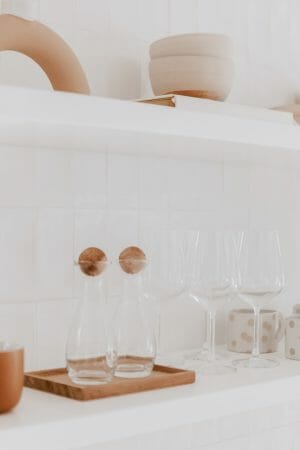
How Clutter Contributes to Anxiety
- Clutter distracts us by drawing our attention away from what we need to be focusing on.
- Clutter makes it difficult to relax. It affects us mentally due to the chaotic state of the house, and physically because it doesn’t give our eyes a peaceful place to rest.
- Excessive clutter—defined as clutter which prevents one from moving about freely in the home—causes guilt, shame, and embarrassment if someone drops by.
- Clutter makes us anxious because we don’t know what it’s going to take (in time and energy) to get to the bottom of the pile. It is an unknown, a variable.
- Clutter frustrates us because we cannot find what we need quickly. That could be a certain file, a phone number, or keys.
Just yesterday, I witnessed a real-life example of how clutter can impact life.
I entered a client’s home for the first time. A spacious, beautiful home at the top of a hill with a million-dollar view.
The husband couldn’t find his van keys. He had planned to take their son on an outing so we could work without interruptions. He ended up taking a different vehicle because he couldn’t find his keys.
Stressful?
Yes.
Did it cause my client anxiety?
She said in the old days it would have, she would have joined in the search and gotten all worked up with him.
Now she just sits back, is supportive, but lets him look for them. (She has a box by the door where keys are supposed to be deposited.) It probably caused him anxiety, but she has learned to detach herself from that cause of stress.
The good news is, according to Sherry Bourg Carter, Psy.D., “unlike other more commonly recognized sources of stress (e.g., our jobs, our relationships), clutter is one of the easiest life stressors to fix.”
And that’s true.
You can either get help from a professional organizer like me, or enlist family and friends, especially those that live with you and may have contributed to the clutter, to help declutter the space and instantly reduce those feelings of anxiety.
I’ve come up with five ideas you can try when DIY-ing clutter cleanup. These methods of decluttering are tried and true; I’ve used them with hundreds of organizing clients, with great results.
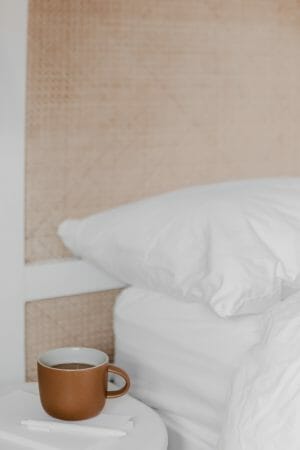
Five Ideas for Low-Stress Decluttering
1. Focus on one area at a time.
I usually recommend starting with the area that gives you the most anxiety.
For most people, that would be a public area like the kitchen or living room. And if you’re having a hard time figuring out where to start, instead of getting “stuck” and quitting, talk it over with a trusted family member or friend. Often just talking through the project will inspire you and help solve issues or questions and helps immensely. It’s like verbal planning!
2. Do a little bit every day.
To reach your goal, work for a pre-defined amount of time each day. In my book Get Organized Quick, I share 180 fifteen-minute mini-projects along with instructions to complete them. I believe this approach suits most people because most are so busy.
To quote the Fly Lady: “You can do anything for 15 minutes!”
You can come up with your own short projects that fit with your needs. Instead of doing the whole kitchen, and then ending up in a mess when you don’t finish in one evening, just choose one or two cabinets to reorganize instead.
Any wellness coach or psychologist will tell you that doing something constructive about the clutter will contribute greatly to your wellbeing. “. . .
Studies have shown that people who live in messy homes experience increased levels of the stress hormone, cortisol – so it makes sense that the removal of clutter can help you feel calmer.
However, the reduction of clutter isn’t the only reason why tidying can be such an effective tool for calming anxiety.
Indeed, alongside the product of tidying up – aka, a clean, tidy living space – the very act of tidying itself could help to reduce anxiety; in a recent survey of 2000 adults by the British supplement provider Healthspan, nearly a quarter of respondents said that organizing something or tidying up was a strategy they use when feeling worried, stressed or anxious.” (Stylist.co.uk)
3. To keep clutter from growing, put a stop to new purchases.
The only exception is buying food and supplies needed for survival. What I’m talking about is the one in, one out rule. When you bring one thing in, you need to take one thing out of your home or garage.
What I recommend for a cluttered space is this: one in, two out.
That means every time you buy one new top, you need to take two tops out of your closet.
I advise clients to think of the two tops they will discard before they buy a new top, as they are in the store. This stems the tide on buying too much. And it causes them to pause and think hard before buying a new item for an already-packed closet.
4. Do I use it, do I love it?
Ask yourself these two questions to help you make the best decisions about what to keep and what to toss.
“I ask my clients these questions as we are working: Do I use it? Do I love it? Asking (these) questions is important when working in the kitchen. (Or any room in the house.)
It doesn’t matter how much you spent on an appliance, or if you are afraid you’ll hurt your husband’s feelings when you get rid of a rice cooker he gave you five years ago; let it go. Get into the purging mindset.” Excerpt from the kitchen chapter in my book, Get Organized Quick.
5. Create good habits so you don’t end up in a pickle again.
As you clean and organize your space, create the habit of putting things away right after you’re done using them.
My Dad instilled this in me at an early age, because one of his pet peeves was not being able to find his tools.
Now I compulsively put tools away during a project. So much so that my husband got a little annoyed at me last week while we worked on our RV!! Oops. Old habits die hard.
But it can be done when you make a conscious effort to create new, healthy habits that serve you well. Even if it’s inconvenient or you don’t think you have enough time, put everything away when you are done using it and teach your family to do the same!
(For more about breaking old habits and creating new habits, see the Habit Rabbit chapter in Get Organized Quick.)
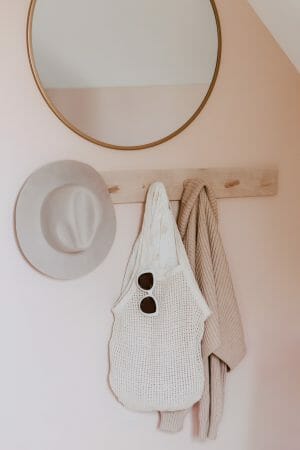
Some final thoughts…
Rome wasn’t built in a day, they say.
Same goes for clutter. What took a year or years to accumulate is not going to be fixed overnight!
I encourage you to be realistic and patient with yourself.
Needing Inspiration?
- It helps to encourage yourself with a picture of the living room, kitchen, or bedroom when it was tidy, if you have one. (Try going to the real estate listing for your home to access some great pictures.)
- Another idea to inspire yourself: gather a couple pictures of living rooms you love and post one or two on a bulletin board nearby. That’s why we love Pinterest, right?
- Try coming up with a mantra that inspires you to purge. Something about relaxing with friends in your organized living room, perhaps. One client I loved said this over and over to me as we worked: I don’t need it.” Music to my ears!
With time and a little effort, your home can look great again, and when you walk into your tidy home each evening, the anxiety will be a thing of the past. Instead, your nest will be a safe haven for you, a place you can be proud to show off, and best of all, a place where you can relax.
